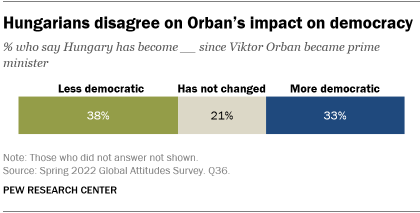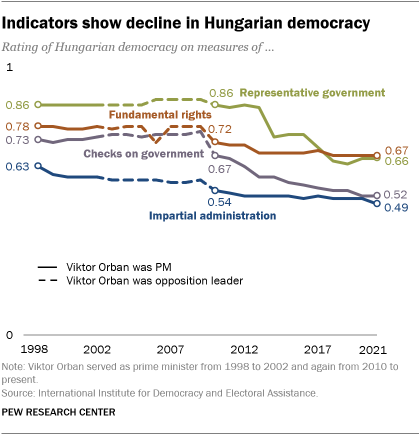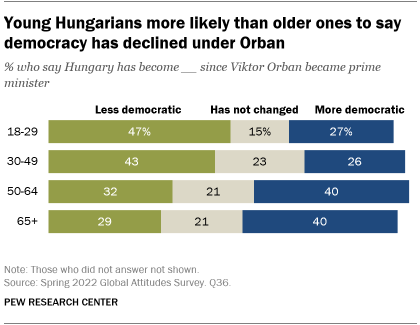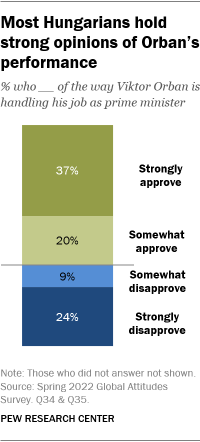
Hungarian Prime Minister Viktor Orban, who is set to speak at the Conservative Political Action Conference in Texas this week, receives generally positive ratings from people in his own country, according to a Pew Research Center survey conducted shortly after his reelection this spring. However, he gets mixed reviews for his impact on democracy in Hungary, and attitudes toward him are less positive among young people and residents of urban areas, including the country’s capital city, Budapest.

About four-in-ten Hungarian adults (38%) say their country has become less democratic since Orban became prime minister. A third say it has become more democratic, and about two-in-ten (21%) say it has not changed.
This Pew Research Center analysis focuses on Hungarian opinion of Prime Minister Viktor Orban. This post draws on a nationally representative, face-to-face survey of 1,041 adults from Apr. 19 to June 3, 2022.
Here are the questions used for this analysis, along with responses. Visit our methodology database for more information about the survey methods used in Hungary.

Indicators from the International Institute for Democracy and Electoral Assistance show a significant backslide in democracy in Hungary since 1998, when Orban took office for the first time as prime minister. The sharpest decline in these indicators – which measure representative government, fundamental rights, checks on government power and impartial administration – appear after 2010, when Orban began his second stint as prime minister. In Europe and globally, these same measures have, on average, remained largely stable in the same period.
The view that the health of democracy has declined under Orban is common among opponents of Fidesz, the right-wing party which he leads. About three-quarters of those with an unfavorable view of Fidesz (76%) say Hungary has become less democratic since Orban took office. The share who says this increases to 86% among Hungarians who have very unfavorable views of Fidesz and see the party as a threat to Hungary’s future. Just 15% of those with a favorable opinion of Fidesz agree that Hungary has become less democratic under Orban.

Young Hungarians ages 18 to 29 are more likely than those 65 and older to say their country is less democratic now than when Orban took office (47% vs. 29%), as are those who live in an urban region compared with rural residents (52% vs. 27%).
Still, regardless of disagreement on the path of their nation’s democracy, most Hungarians approve of Orban’s performance as prime minister. As of this year’s survey, conducted in the weeks following his landslide electoral victory, 57% approve of Orban; just one-third disapprove of him.

Views of Orban tend to be deeply held in Hungary: Roughly two-thirds of those who offer either positive or negative evaluations of Orban say they feel strongly. This includes 37% who strongly approve and 24% who strongly disapprove of him.
Like Hungarians’ views of democracy in their country, attitudes about Orban vary by age and geography. Fewer than half (45%) of Hungarians ages 18 to 29 offer positive ratings of Orban’s performance, compared with 70% of those ages 65 and older.
In cities and urban areas, 44% approve of their prime minister, compared with 58% in suburban or mixed regions and 69% in rural areas. The majority of Hungarians reside in suburban or mixed areas, while the populations of the country’s urban and rural regions are roughly the same – just under 20% each – according to the most recent data from the European Commission.
In 2019, Pew Research Center asked Hungarians and other Europeans how much confidence they had in Orban to do the right thing regarding world affairs. In that survey, 45% of Hungarians said they were confident in their prime minister. But across the 14 European Union member countries in the survey, a median of just 27% of adults said the same.
Note: Here are the questions used for this analysis, along with responses and the full dataset. Visit our methodology database for more information about the survey methods used in Hungary.



